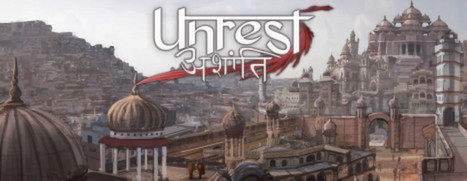Judgement: Recommended
View review on Steam
+ Fantastic writing—some of the best and most nuanced I've seen in a game.
+ Unique, well-developed fantasy setting.
- The graphics and UI aren't particularly good, although I didn't find them distracting.
- The background music is bland and has far too short of a loop
- Walking mechanics are awkward.
- It's harder to click on people to talk to them than it should be.
* I personally found the ending satisfying. Your mileage may vary.
Unrest is a series of vignettes about life in the rundown, increasingly fractured city-state of Bhimra. There is an overarching plot that loosely ties everyone's lives together, but there is no central protagonist. In fact, in keeping with the game's excellent sense of moral nuance, I was often astonished by how sympathetic I grew to characters that were antagonists in each other's stories. With most of the characters you're only getting a brief glimpse into their lives before moving on, so how their personal stories end varies wildly depending on your choices. That grants Unrest significantly more narrative freedom than, say, a TellTale game has.
The dialogue system is almost ridiculously flexible. The three stats measured when speaking to someone, which relate to how much someone likes you, respects you, and fears you, are a genius way of adding weight to every choice. It gives you another way to read each social situation, and additionally serves as helpful shorthand for developing characters. For instance, you can track whether the person you're talking to respects you more for delivering hard truths or staying polite, and you can see the immediate turn from friendliness to contempt when, in an early chapter, you reveal to a bigot that you're a woman.
The ending may seem abrupt, but I was warned in advance about that and honestly expected much worse. It ties up what happens to many of the major characters, but it's still open-ended enough that you can choose to believe whatever you like about what ultimately happens to the city. A tidier ending feels like it would betray Unrest's themes. Life doesn't stop just because you've hit a satisfactory end point, and neither do the city's conflicts just because you've completed the game.
TL;DR: I came away from Unrest feeling like I'd read a great fantasy novel. The dialogue is fantastic. The characters are somehow sympathetic, complex, and flexibly written all at once, and the worldbuilding is paced almost perfectly. If you're a fan of good writing in video games and don't care if the game itself is mechanically rough around the edges, you should pick up a copy as soon as you get the chance.
+ Unique, well-developed fantasy setting.
- The graphics and UI aren't particularly good, although I didn't find them distracting.
- The background music is bland and has far too short of a loop
- Walking mechanics are awkward.
- It's harder to click on people to talk to them than it should be.
* I personally found the ending satisfying. Your mileage may vary.
Unrest is a series of vignettes about life in the rundown, increasingly fractured city-state of Bhimra. There is an overarching plot that loosely ties everyone's lives together, but there is no central protagonist. In fact, in keeping with the game's excellent sense of moral nuance, I was often astonished by how sympathetic I grew to characters that were antagonists in each other's stories. With most of the characters you're only getting a brief glimpse into their lives before moving on, so how their personal stories end varies wildly depending on your choices. That grants Unrest significantly more narrative freedom than, say, a TellTale game has.
The dialogue system is almost ridiculously flexible. The three stats measured when speaking to someone, which relate to how much someone likes you, respects you, and fears you, are a genius way of adding weight to every choice. It gives you another way to read each social situation, and additionally serves as helpful shorthand for developing characters. For instance, you can track whether the person you're talking to respects you more for delivering hard truths or staying polite, and you can see the immediate turn from friendliness to contempt when, in an early chapter, you reveal to a bigot that you're a woman.
The ending may seem abrupt, but I was warned in advance about that and honestly expected much worse. It ties up what happens to many of the major characters, but it's still open-ended enough that you can choose to believe whatever you like about what ultimately happens to the city. A tidier ending feels like it would betray Unrest's themes. Life doesn't stop just because you've hit a satisfactory end point, and neither do the city's conflicts just because you've completed the game.
TL;DR: I came away from Unrest feeling like I'd read a great fantasy novel. The dialogue is fantastic. The characters are somehow sympathetic, complex, and flexibly written all at once, and the worldbuilding is paced almost perfectly. If you're a fan of good writing in video games and don't care if the game itself is mechanically rough around the edges, you should pick up a copy as soon as you get the chance.
Review posted on 17/01/2019, 21:17:00.
